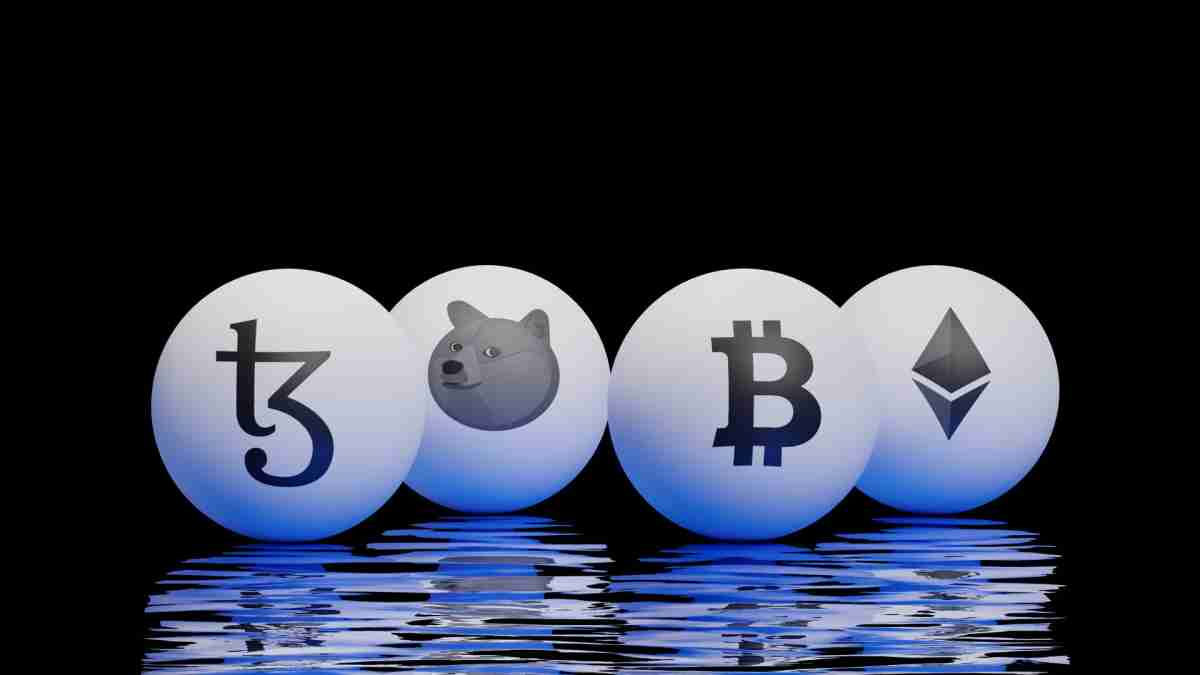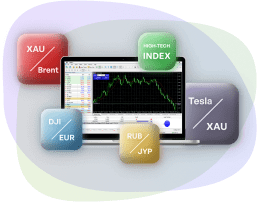- Education
- Learn to Trade Crypto
- What is Cryptocurrency Market
What is Cryptocurrency Market
What is Crypto Market
The crypto market works just like any other financial arena. Just like with stocks or forex, your main goal is to predict the future value of a cryptocurrency. Cryptocurrencies are traded in pairs, which means that you will be speculating on the value of the digital currency in relation to another asset. This can be either a fiat currency like US dollars or an alternative crypto asset like bitcoin.

In any case, crypto pairs change in price every second - like all financial markets.
Further in the article we will talk more about it. Let’s go.
KEY TAKEAWAYS
- Cryptocurrency market is a set of all released cryptocurrencies, exchange and over-the-counter infrastructure for its purchase and sale.
- The crypto market works just like any other financial arena. Just like with stocks or forex, your main goal is to predict the future value of a cryptocurrency.
- Market capitalization can be used to compare and rank coins in the cryptocurrency market.
What is Cryptocurrency Market
Cryptocurrency market (crypto market) is a set of all released cryptocurrencies, exchange and over-the-counter infrastructure for its purchase and sale.
There are two types of cryptocurrency markets:
- An exchange which is an organized cryptocurrency market, where buying and selling is carried out in accordance with the rules established by the exchange.
- Cryptocurrencies that have passed the listing procedure on the exchange are traded on the exchange market. An over-the-counter (OTC) is an unorganized cryptocurrency market in which the value is determined by an individual agreement between the seller and the buyer.
How Crypto Market Works
Cryptocurrencies aren’t controlled by the government or central regulatory bodies: cryptocurrency operates outside the banking system, using various types of coins where bitcoin is the main player.
Here, below you will see the main components of Cryptocurrency Market
Mining
Cryptocurrencies are generated through a process called "mining", which is a complex process. Essentially, miners must solve certain mathematical puzzles on specially equipped computer systems in order to receive bitcoins in return. In an ideal world, it would take just 10 minutes for a person to mine one bitcoin, but in reality, this process takes approximately 30 days.
Buying, Selling and Storing
Traders can buy and sell cryptocurrencies on central exchanges, from brokers or individual currency holders. Once a trader bought cryptocurrency, now it can be stored in digital wallets. Digital wallets can be hot or cold. Hot, means that the wallet is connected to the Internet, which makes it easier to conduct transactions, but makes it vulnerable to theft and fraud. Cold storage, on the other hand, is safer but makes the transaction more difficult.
Transacting
Cryptocurrency transactions such as Bitcoin, Ethereum, Ripple, etc. can be easily transferred from one digital wallet to another, you can do the following:
- Use cryptocurrencies to buy goods or services
- Trade them
- Exchange them for cash
If you are using Bitcoin for shopping, the easiest way to do this is to make transactions with a debit card. You can also use these debit cards to withdraw cash like from an ATM. Cryptocurrency to cash conversion is also possible using bank accounts or peer-to-peer transactions. We have a cryptocurrency converter if you're interested.
Despite the fact that the cryptocurrency market is developing rapidly, it is fair to also note its pros and cons.
Pros and Cons of cryptocurrencies
Pros
High risk, high reward - it could be true for both - pros and cons of cryptocurrencies. Today, there are a huge number of cryptocurrencies on the market, and each of them has its own characteristics. But all cryptocurrencies have a few things in common - a tendency to sudden jumps and drops in value.
Prices are determined primarily by the supply of coins from miners and the demand for them from buyers. And this dynamic of supply and demand can bring huge profits.
Blockchain technology is inherently safe - Some of the main advantages of cryptocurrencies are related to the infrastructure that supports them, namely the blockchain, a decentralized data store that tracks every transaction made on it.
Once you make an entry on the blockchain, it can no longer be erased. And since the blockchain is stored decentralized across multiple computers, no single hacker can access the entire chain in one go; any information stored in it is safe forever.
Cryptocurrency Market Hours - An important advantage of cryptocurrency over banks is that the Cryptocurrency market operates around the clock and seven days a week, that is, the market is always open. You don't have to wait for the NYSE, NASDAQ or any other exchange to start trading during the day if you want to buy, sell or exchange cryptocurrencies.
Cryptocurrencies not subject to inflation - Cryptocurrencies are not tied to one currency or economy, so their price reflects global demand. But what about the inflation of the cryptocurrencies themselves? As an investor, you can rest easy for the most part.
The number of coins is limited, so the amount available cannot get out of hand, so there is no inflation. For example Bitcoin has a general limit, Ethereum has an annual limit, but in any case, this approach keeps inflation in check.
Cons
Time consuming, when it comes to understanding what cryptocurrency is about - Cryptocurrencies can take a while to get your head around. The concept of cryptocurrency not mentioning the blockchain requires more than a minute to wrap your head around. Investing in something you don’t really understand is itself a risk.
Cryptocurrencies are volatile - Cryptocurrency can skyrocket to stunningly heights, but it can also crash to horrific lows just as quickly. So if you are looking for consistent returns, this might not be the best choice. The cryptocurrency market mostly thrives on speculation, and its relatively small size makes it more vulnerable to price fluctuations.
Cryptocurrencies cannot yet be considered as long-term investments - Although cryptocurrencies have become widely known and continue to gain popularity, we must not forget that they have only existed for a little over a decade.
Stock markets, by contrast, can look back centuries. Gold has been a proven store of value for thousands of years. No one really knows what will happen to cryptocurrencies in the future and you need to be brave to enter these uncharted waters as an investor.
What is the Market Cap of Cryptocurrency
Market capitalization shows the total size of a cryptocurrency's place in the market.
Calculating the market capitalization of a coin is simple: all you have to do is multiply the number of issued coins by the price of one coin. For example, as of April 2022, the supply of ether was 120 million coins. Multiply this by the coin price of $1,239.10 and you have an Ethereum market cap of $148.7 billion USD.
Market capitalization can be used to compare and rank coins in the cryptocurrency market. For example, Bitcoin has a price of $21,134.20 and circulates in the amount of 19 million tokens, while the market capitalization of the cryptocurrency is about $401 billion. This is approximately 270 times the market capitalization of Ethereum.
Market capitalization fluctuates with prices and circulating supply of crypto coins and tokens, but the relative ratings are relatively stable. Cryptocurrencies with higher market caps tend to have more investors and more influence on the price of other coins and tokens.
This is one of the reasons why the market capitalization of a cryptocurrency is the usual basis for ranking it in the cryptocurrency market. When you evaluate the place of a particular cryptocurrency in the market, price alone is not enough. Market capitalization is a more accurate indicator.
Cryptocurrency Market Hours
Cryptocurrency trading hours are different from those of the Forex market; it is open 24 hours a day, seven days a week. Crypto markets are always open. Because, unlike stocks and commodities, the crypto market isn't a regulated exchange, it is spread across a decentralized network of computers.
| Trading Instruments | Trading hours (CET) |
|---|---|
| SOLUSD | Sunday (00:00 — 09:00, 10:00 — 24:00) ,Monday — Thursday (00:00 — 23:00, 23:15 — 24:00) ,Friday (00:00 — 22:00) ,Saturday (00:00 — 21:00, 22:00 — 24:00) |
| ADAUSD | Sunday (00:00 — 09:00, 10:00 — 24:00) ,Monday — Thursday (00:00 — 23:00, 23:15 — 24:00) ,Friday (00:00 — 22:00) ,Saturday (00:00 — 21:00, 22:00 — 24:00) |
| DASHUSD | Sunday (00:00 — 09:00, 10:00 — 24:00) ,Monday — Thursday (00:00 — 23:00, 23:15 — 24:00) ,Friday (00:00 — 22:00) ,Saturday (00:00 — 21:00, 22:00 — 24:00) |
| ZECUSD | Sunday (00:00 — 09:00, 10:00 — 24:00) ,Monday — Thursday (00:00 — 23:00, 23:15 — 24:00) ,Friday (00:00 — 22:00) ,Saturday (00:00 — 21:00, 22:00 — 24:00) |
| EOSUSD | Sunday (00:00 — 09:00, 10:00 — 24:00) ,Monday — Thursday (00:00 — 23:00, 23:15 — 24:00) ,Friday (00:00 — 22:00) ,Saturday (00:00 — 21:00, 22:00 — 24:00) |
| XMRUSD | Sunday (00:00 — 09:00, 10:00 — 24:00) ,Monday — Thursday (00:00 — 23:00, 23:15 — 24:00) ,Friday (00:00 — 22:00) ,Saturday (00:00 — 21:00, 22:00 — 24:00) |
| XLMUSD | Sunday (00:00 — 09:00, 10:00 — 24:00) ,Monday — Thursday (00:00 — 23:00, 23:15 — 24:00) ,Friday (00:00 — 22:00) ,Saturday (00:00 — 21:00, 22:00 — 24:00) |
| ETCUSD | Sunday (00:00 — 09:00, 10:00 — 24:00) ,Monday — Thursday (00:00 — 23:00, 23:15 — 24:00) ,Friday (00:00 — 22:00) ,Saturday (00:00 — 21:00, 22:00 — 24:00) |
| DOGEUSD | Sunday (00:00 — 09:00, 10:00 — 24:00) ,Monday — Thursday (00:00 — 23:00, 23:15 — 24:00) ,Friday (00:00 — 22:00) ,Saturday (00:00 — 21:00, 22:00 — 24:00) |
| LTCUSD | Sunday (00:00 — 09:00, 10:00 — 24:00) ,Monday — Thursday (00:00 — 23:00, 23:15 — 24:00) ,Friday (00:00 — 22:00) ,Saturday (00:00 — 21:00, 22:00 — 24:00) |
| XRPUSD | Sunday (00:00 — 09:00, 10:00 — 24:00) ,Monday — Thursday (00:00 — 23:00, 23:15 — 24:00) ,Friday (00:00 — 22:00) ,Saturday (00:00 — 21:00, 22:00 — 24:00) |
| BCHUSD | Sunday (00:00 — 09:00, 10:00 — 24:00) ,Monday — Thursday (00:00 — 23:00, 23:15 — 24:00) ,Friday (00:00 — 22:00) ,Saturday (00:00 — 21:00, 22:00 — 24:00) |
| BTCUSD | Sunday (00:00 — 09:00, 10:00 — 24:00) ,Monday — Thursday (00:00 — 23:00, 23:15 — 24:00) ,Friday (00:00 — 22:00) ,Saturday (00:00 — 21:00, 22:00 — 24:00) |
| ETHUSD | Sunday (00:00 — 09:00, 10:00 — 24:00) ,Monday — Thursday (00:00 — 23:00, 23:15 — 24:00) ,Friday (00:00 — 22:00) ,Saturday (00:00 — 21:00, 22:00 — 24:00) |
Bottom Line on What is Crypto Market
There is no doubt that cryptocurrencies are an exciting new tool that has the potential to change global financial markets. Time will tell if the popularity of cryptocurrencies will continue to grow or is this a temporary fad? However, nowadays many traders choose to trade cryptocurrency CFDs, and when they do so through IFC Markets, they benefit from leverage, tight spreads, no expiration, and access to free training.
Crypto FAQs
What is Cryptocurrency Trading?
Cryptocurrency trading is the exchange of digital currency between traders. The fluctuations caused by supply and demand allow traders to profit from it. Cryptocurrency trading is both risky and rewarding due to its volatility.
How to Trade Cryptocurrencies?
You’ll need to open an account with a crypto brokerage company. The next step is to choose a trading platform. After that choose crypto to invest in and strategy to trade with. Final step is to store your cryptocurrency.
Can you Trade Crypto 24/7?
Yes. Cryptocurrency markets are open 24 hours a day, 7 days a week all year round. Traders have the opportunity to buy and sell without restrictions as the cryptocurrency markets do not close.
What are Most Traded Cryptos?
These are the 5 most traded cryptos all over the world
- Bitcoin - Market cap over $846 billion
- Ethereum - Market cap over $361 billion
- Tether - Market cap - over $79 billion
- Binance Coin - Market cap - over $68 billion
- XRP - Market cap - over $37 billion
What is Cryptocurrency Market?
Cryptocurrency is a form of decentralized currency and It's a completely digital asset. At its core, cryptocurrency uses blockchain technology to generate code segments that are unique for each transaction, just like serial numbers. Every time cryptocurrencies exchange hands, code segments are written to a decentralized ledger.





